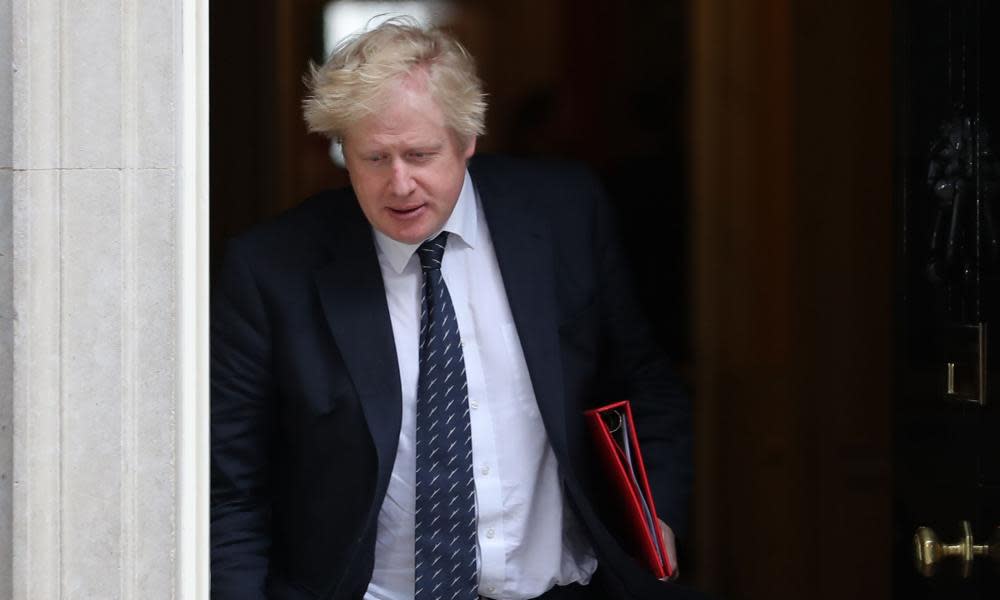Russian spy poisoning: 'smug' response shows guilt, says Boris Johnson

Boris Johnson has stepped up Britain’s war of words with Russia by accusing the Kremlin of glorying in the poisoning of the double agent Sergei Skripal.
The foreign secretary said Russia had deliberately chosen the Soviet-era nerve agent novichok in the Salisbury attack as a warning to opponents of Vladimir Putin.
Theresa May will visit Salisbury on Thursday to meet local businesses and members of the public, as well as receiving a briefing from Public Health England.
Speaking as the international community rallied behind the UK, including the previously sceptical French, Johnson said: “Russia is the only country known to have developed this type of agent. I’m afraid the evidence is overwhelming that it is Russia.”
If you were at the Mill or Zizzi restaurant in Salisbury city centre on Sunday 4 and Monday 5 March, you can share your experience with us by using our encrypted form.
Your responses will only be seen by the Guardian and we will treat them confidentially. Your stories will help our journalists have a more complete picture of these events and we will use some of them in our reporting.
Commenting on Russia’s dismissal of the accusation, he told BBC News: “There is something in the kind of smug, sarcastic response that we’ve heard that indicates their fundamental guilt. They want to simultaneously deny it, yet at the same time to glory in it.”
He also suggested that Putin had some responsibility for the attack. “There is very little doubt in people’s minds that this is a signature act by the Russia state – deliberately using novichok, a nerve agent developed by Russia to punish a Russian defector as they would see it, and in the run up to Vladimir Putin’s election.
“This was a former Russian agent living in this country who had been singled out already by the Russian state as an object for revenge and retaliation, and Vladimir Putin has been on the TV only recently saying that such people deserve to be poisoned, to choke on their own 30 pieces of silver. This is a way of showing look at what happens to people who stand up to our regime.”
Johnson said he had been “very heartened” by the strength of the support around the world for Britain’s stance against Russia. On Wednesday a spokesman for the French president, Emmanuel Macron, cautioned the UK not to engage in “fantasy politics”. But on Thursday after holding talks with Theresa May on the incident, Macron shifted stance, saying France shared the UK’s conclusion that there was “no other plausible explanation” other than the involvement of Russia.
The Elysée Palace said the UK had “kept France closely informed of the clues gathered by British investigators” as well as the “evidence demonstrating the responsibility of Russia in the attack”. France “accepts this conclusion” and “expresses its full solidarity with its ally”, the statement said.
Statement from @elysee #SalisburyChemicalAttack pic.twitter.com/ZbV14vDhox
— Aurélie Bonal (@AurelieBonal) March 15, 2018
The US ambassador to the United Nations, Nikki Haley, gave unambiguous support to the UK at the security council.
Pressed repeatedly on BBC Radio 4’s Today programme about earlier French scepticism about the UK’s claims, Johnson said: “President Macron has issued a very strong statement of condemnation.” He added: “Different French spokespeople were saying different things.”
Johnson also confirmed the UK would provide samples of the nerve agent used in the attack to the Organisation for the Prohibition of Chemical Weapons.
He said: “We have been entirely in conformity with OPCW procedures … We will be submitting a sample so that they can look at the novichok and make their own assessment. We believe the evidence is absolutely overwhelming.”
He defended the UK’s decision to expel 23 Russian diplomats in response to the attack. He said: “What we have done in expelling 23 diplomats, probably undeclared agents, is something far beyond what Vladimir Putin had bargained for. We have basically eviscerated his intelligence capabilities in this country for decades to come.”
Johnson’s comments come after he employed deliberately Churchillian language in an opinion piece for the Washington Post, writing: “A tranquil medieval city has witnessed the first offensive use of a nerve agent in Europe since World War II.”
He added: “Britain is striving to uphold the rules on which the safety of every country depends. I hope and believe that our friends will stand alongside us.
“There is a reason for choosing novichok. In its blatant Russian-ness, the nerve agent sends a signal to all who may be thinking of dissent in the intensifying repression of Putin’s Russia.”
Maria Zakharova, the spokeswoman for the Russian foreign ministry, accused Britain of refusing to cooperate with Moscow in the investigation of the incident. Zakharova, who said Moscow was concerned about the use of chemical weapons in Britain, said allegations that Russia was involved were “insane”.
Michael Gove, the environment secretary, has chaired an across-government ministerial recovery group, to begin plans for the clean-up operation after the attack.
A Downing Street spokesman said May would also be continuing conversations with world leaders. The prime minister’s national security advisor Mark Sedwill will address Nato later on Thursday.
“We are looking for a robust international response,” the spokesman said, adding the precise action was still being discussed. “We have spoken with our allies, there’s been a very positive response. The conversations continue to take place.”

 Yahoo News
Yahoo News 
